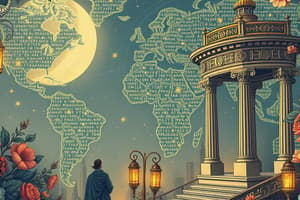Podcast
Questions and Answers
What percentage of the world's population identifies with a religious group according to the text?
What percentage of the world's population identifies with a religious group according to the text?
- 84% (correct)
- 61%
- 73%
- 45%
Which religion is missing from the list of major religions in the text?
Which religion is missing from the list of major religions in the text?
- Judaism
- Sikhism
- Shintoism (correct)
- Islam
In 2015, approximately how many people in the world claimed to have no religious affiliations?
In 2015, approximately how many people in the world claimed to have no religious affiliations?
- 3.4 billion
- 2.8 billion
- 5.6 billion
- 1.2 billion (correct)
What does the Latin root 'religare' mean?
What does the Latin root 'religare' mean?
Which demographic generally produces more children and is younger according to the text?
Which demographic generally produces more children and is younger according to the text?
What was the percentage of Buddhists in the world according to the 2015 figures provided in the text?
What was the percentage of Buddhists in the world according to the 2015 figures provided in the text?
How does magic differ from religion in terms of power dynamics as per the text?
How does magic differ from religion in terms of power dynamics as per the text?
What is the key difference between magic and religion according to the text?
What is the key difference between magic and religion according to the text?
What is a central aspect common to all religions according to the text?
What is a central aspect common to all religions according to the text?
Which concept relates to humans directly influencing nature according to the text?
Which concept relates to humans directly influencing nature according to the text?
What kind of issues led to the development of both magic and religion according to the text?
What kind of issues led to the development of both magic and religion according to the text?
Which best describes the purpose of magical rites as per the text?
Which best describes the purpose of magical rites as per the text?
What role do some theological oriented observers argue religion plays in shaping globalization?
What role do some theological oriented observers argue religion plays in shaping globalization?
How do many religious commentators view globalization?
How do many religious commentators view globalization?
What is one way in which globalization implicates religion?
What is one way in which globalization implicates religion?
What does globalization provide fertile ground for?
What does globalization provide fertile ground for?
How do some religious commentators perceive the outcomes of globalization?
How do some religious commentators perceive the outcomes of globalization?
What do many religions become in the context of globalization according to the text?
What do many religions become in the context of globalization according to the text?
What is the key difference between imitative magic and contagious magic?
What is the key difference between imitative magic and contagious magic?
What is the main characteristic of a cult according to the passage?
What is the main characteristic of a cult according to the passage?
What were the main responses to deep insecurities in Europe and America until the eighteenth century, and in much of the rest of the world until the twentieth century?
What were the main responses to deep insecurities in Europe and America until the eighteenth century, and in much of the rest of the world until the twentieth century?
What was the key difference in the responses to deep insecurities between the nineteenth and twentieth centuries?
What was the key difference in the responses to deep insecurities between the nineteenth and twentieth centuries?
What is the relationship between insecurity, ideology, and theology according to the passage?
What is the relationship between insecurity, ideology, and theology according to the passage?
What is the main purpose of the passage?
What is the main purpose of the passage?
Flashcards
Religious affiliation (global %)
Religious affiliation (global %)
About 84% of people worldwide identify with a religious group.
Missing major religion
Missing major religion
Shintoism.
No religious affiliation (2015)
No religious affiliation (2015)
Approximately 1.2 billion people.
'Religare' meaning
'Religare' meaning
Signup and view all the flashcards
More children demographic
More children demographic
Signup and view all the flashcards
Buddhists percentage (2015)
Buddhists percentage (2015)
Signup and view all the flashcards
Magic vs. Religion (power)
Magic vs. Religion (power)
Signup and view all the flashcards
Magic vs. Religion (rites)
Magic vs. Religion (rites)
Signup and view all the flashcards
Core religion aspect
Core religion aspect
Signup and view all the flashcards
Contagious magic
Contagious magic
Signup and view all the flashcards
Magic/Religion development cause
Magic/Religion development cause
Signup and view all the flashcards
Magical rites purpose
Magical rites purpose
Signup and view all the flashcards
Religion's role in globalization
Religion's role in globalization
Signup and view all the flashcards
Religious commentators view on globalization
Religious commentators view on globalization
Signup and view all the flashcards
Globalization implicates religion
Globalization implicates religion
Signup and view all the flashcards
Globalization's fertile ground
Globalization's fertile ground
Signup and view all the flashcards
Religious commentators' perception of globalization outcomes
Religious commentators' perception of globalization outcomes
Signup and view all the flashcards
Religions turn into cultural resources
Religions turn into cultural resources
Signup and view all the flashcards
Imitative vs. contagious magic
Imitative vs. contagious magic
Signup and view all the flashcards
Main cult characteristic
Main cult characteristic
Signup and view all the flashcards
Responses to deep insecurities (pre-18th century)
Responses to deep insecurities (pre-18th century)
Signup and view all the flashcards
Responses to insecurities (19th vs. 20th century)
Responses to insecurities (19th vs. 20th century)
Signup and view all the flashcards
Insecurity, ideology, & theology relationship
Insecurity, ideology, & theology relationship
Signup and view all the flashcards
Passage purpose
Passage purpose
Signup and view all the flashcards
Study Notes
Globalization of Religions
- 84% of the world's population identifies with a religious group, with Islam, Christianity, Hinduism, Buddhism, and Judaism being the top five.
- 16% of the world's population, or 1.2 billion people, have no religious affiliation.
What is Religion?
- Etymologically, religion comes from the Latin word "religare", meaning to bind together, the bond between God and man.
Types of Religious Movements
- Cult: A small, loosely organized, and transient religious movement that introduces new religious ideas and principles, rejecting traditional values and practices.
- Magic: A belief that humans can directly affect nature and one another for good and ill, by their own efforts, with two forms: imitative and contagious.
Globalization of Religion and Insecurity
- In the 19th century, the French and Industrial Revolutions led to ideologies of nationalism and socialism.
- In the 20th century, the defeats in the First World War resulted in the ideologies of Soviet communism and German Socialism.
- In the past, responses to deep insecurities were theological or religious, rather than ideological.
Religious Perspectives on Globalization
- Religion has an essential role in shaping globalization and can provide a positive global ethic.
- Globalization implicates religion and religions in several ways, calling forth religious response and interpretation.
- Religions have played important roles in bringing about and characterizing globalization.
Definitions of Religion
- John Cuber: "Religion is a culturally entrenched pattern of behaviour composed of sacred beliefs, emotional feelings accompanying the beliefs, and overt conduct implementing the beliefs and feelings."
- Religion is a system of beliefs and practices shared by a group of people, helping them explain questions about life, afterlife, and how to live life in relation to the supernatural, transcendent, and sacred.
Studying That Suits You
Use AI to generate personalized quizzes and flashcards to suit your learning preferences.




